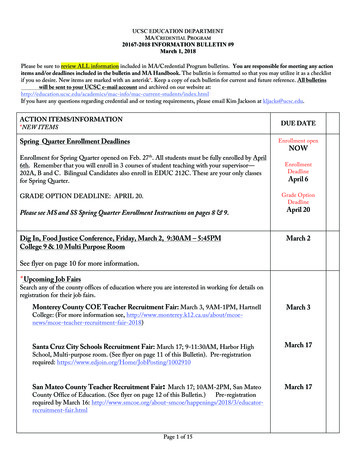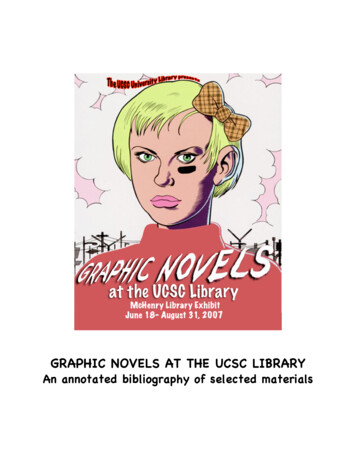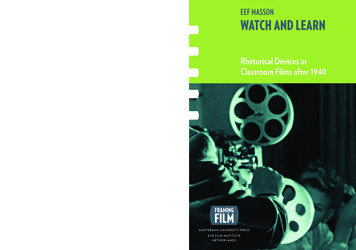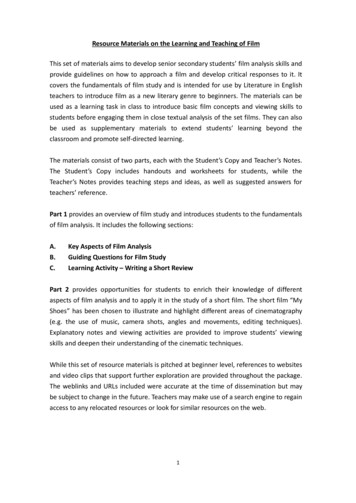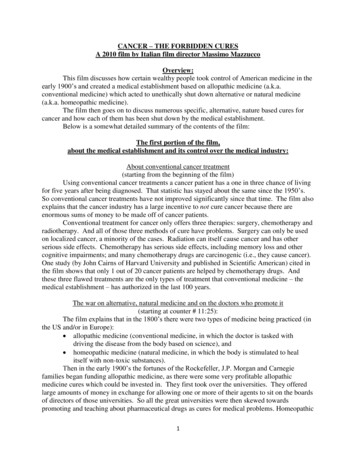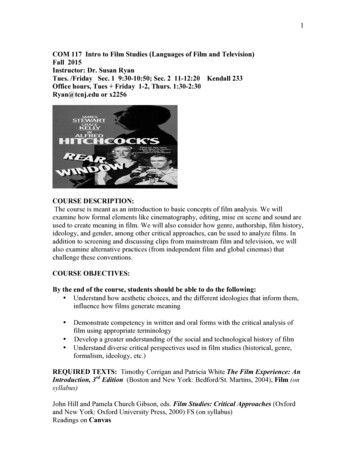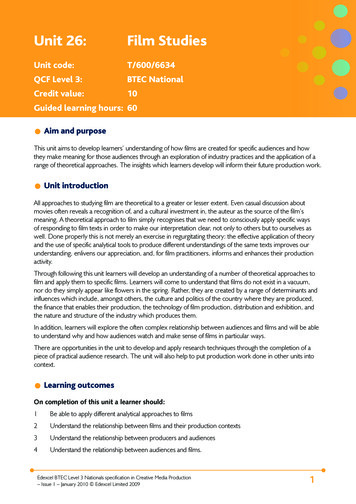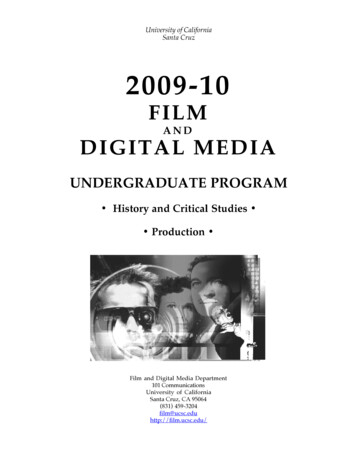
Transcription
University of CaliforniaSanta Cruz2009-10FILMANDDIGITAL MEDIAUNDERGRADUATE PROGRAM History and Critical Studies Production Film and Digital Media Department101 CommunicationsUniversity of CaliforniaSanta Cruz, CA 95064(831) 459-3204film@ucsc.eduhttp://film.ucsc.edu/
FILM AND DIGITAL MEDIA MAJORAT UC SANTA CRUZPHILOSOPHY:The Film and Digital Media major at UCSC offers an integrated curriculum involving theory,criticism, and cultural analysis, as well as a production program in the aesthetics andtechniques of film, video and digital media. This Bachelor of Arts degree program providesstudents with the critical skills, theoretical concepts, and historical knowledge necessary toanalyze cinema, television, video art, and new media, along with the up-to-date technicalknowledge, practical skills, and artistic background needed to produce film, video, and digitalmedia. The major provides a course of study that develops an understanding of movingimage and digital media as essential tools of communication and artistic practice.Students in the general Film and Digital Media major develop an understanding of majormovements in world cinema and different aesthetic approaches to the medium, while alsostudying the cultural impact of television and the rise of video and digital art in recentdecades. Students in the highly selective Production Concentration are encouraged todemonstrate technical proficiency and creative vision in film and digital media productionwhile creating films, videos and digital artworks. Students admitted to the Critical StudiesConcentration focus on advanced study of moving image history and theory.The Integrated Critical Practice Concentration will serve students currently enrolled in themajor who have a special aptitude for and interest in combining work in critical studies andproduction. The concentration provides them with a more rigorous pathway through themajor and, in their senior year, allows them to work on a senior project that integratescreative and intellectual work.Students in all facets of the major develop skills in media analysis while maintaining abroadly-based liberal arts perspective. The UCSC program is interdisciplinary, combiningtheory and practice in film, video, and digital media with study in other areas of the arts,humanities, and social sciences that help students understand the role these media play insociety.Over the years our graduates have established careers as professionals in the fields of film,video, television and digital media, working as filmmakers, editors, digital media artists, filmarchivists, media educators, film festival curators, script analysts, television producers,computer programmers and studio executives. Recent graduates have screened work at theSundance Film Festival, Cinequest, Milan Film Festival, Santa Cruz Film Festival, and onHBO. Graduates of the Film and Digital Media program also have a strong track record ofgaining admission to the top graduate programs for M.A., M.F.A. and Ph.D. degrees,including USC, UCLA, NYU, Columbia, The American Film Institute, Cal Arts, the Universityof Iowa, and the University of Wisconsin-Madison.Professor Eli Hollander with Film170B, Fundamentals of Film andVideo Production, in the department’sDigital Media Lab. (Fall 2004)
FACULTY MEMBERS AND THEIR PROFESSIONAL INTERESTSLawrence Andrews, Associate Professor: Film and video production, installation and media art.http://film.ucsc.edu/faculty/lawrence andrewsCaetlin Benson-Allott, Assistant Professor: Distribution studies; technology and culture; film historyand theory; new media studies; queer and feminist theory; horror and the history of special effects.http://film.ucsc.edu/faculty/caetlin benson-allottSharon Daniel, Professor: Participatory culture, technology and social inclusion, public art.http://arts.ucsc.edu/sdanielIrene Gustafson, Assistant Professor: Producing across the boundaries between “theory” and“practice”; non-fiction; gender and queer studies; production e Hastie, Associate Professor: Theories and historiographies of film and television; criticalstudies in feminism, authorship, interdisciplinarity, and material forms.http://film.ucsc.edu/faculty/amelie hastieEli Hollander, Professor: Film and video directing, editing, cinematography, videography, digitalimage generation and screenwriting. http://film.ucsc.edu/faculty/eli hollanderL.S. Kim, Associate Professor: Television history and theory; racial discourse; feminist criticism;Asian American media production; industrial practices and social change in both mainstreamHollywood and alternative media. http://film.ucsc.edu/faculty/ls kimPeter Limbrick, Assistant Professor: International cinemas, intersections of race, gender, andsexuality; theories of globalization, transnationalism, and postcoloniality; queer theory.http://film.ucsc.edu/faculty/peter limbrickCharles Lord, Professor: Film and video directing and editing; video theory and history; videoinstallation; screenwriting; documentary production. http://arts.ucsc.edu/faculty/LordIrene Lusztig, Assistant Professor: Film and video production; experimental documentary;ethnographic film; autobiographical film; editing. http://film.ucsc.edu/faculty/irene lusztigMargaret Morse, Professor: Digital and electronic media theory and criticism; media art; mediahistory; technology and culture; film history and theory; German cinema; documentary and sciencefiction. http://film.ucsc.edu/faculty/margaret morseWarren Sack, Associate Professor: Theory and practice of digital media; software design and mediatheory. http://people.ucsc.edu/ wsackShelley Stamp, Professor: Film history, theory, and criticism; silent cinema; female filmmakers; filmcensorship; histories of moviegoing; early Hollywood. http://arts.ucsc.edu/faculty/stampGustavo Vazquez, Associate Professor: Film and video production; directing drama, documentaryand experimental; cross-cultural experiences in film; film festival curator.http://film.ucsc.edu/faculty/gustavo vazquezYiman Wang, Assistant Professor: Transnational/trans-regional Chinese cinemas of all periods;Intra-Asian and cross-Pacific film remakes; Pan-East Asian celebrity culture; East Asian culturalstudies; Asian American cinema. http://film.ucsc.edu/faculty/yiman wangInterviews with most of our faculty are available on the department website:http://film.ucsc.edu/people
OVERVIEW OF FILM AND DIGITAL MEDIAMajor: The general Film and Digital Media major requires three lower-division, nine upperdivision courses in residence, and satisfaction of the senior comprehensive requirement.Students are encouraged to complete the lower-division courses as early in their studies aspossible so that the petition to full major status is accomplished no later than the first quarterof the junior year. Acceptance into the general major does not guarantee acceptance intoeither concentration, which must be applied for separately.Students are advised to take FILM 120, Introduction to Film Theory and Criticism, during thefall quarter of their second year: FILM 20A and satisfaction of the Entry Level Writing andComposition requirements (UCSC GEs) are prerequisites for FILM 120. Completion of FILM120 will satisfy the General Education W (writing) requirement and will prepare students forfurther study in upper-division Film and Digital Media courses.Most upper-division courses offered by the Film and Digital Media Department are limited inenrollment: Admission to them is restricted based on completion of prerequisites and othermajor requirements.Prior to enrolling in upper-division courses in production, digital media, or new media,students are strongly encouraged to become familiar with the basics of computers,specifically the Macintosh platform. UCSC Instructional Computing is a campus unit thatoffers training and support for students who need to develop their computer skills. For moreinformation, visit their website at http://ic.ucsc.edu/.DECLARING THE FILM & DIGITAL MEDIA MAJORPlease note: Indicating a major at admission only demonstrates an interest in a field of studyand is not a declaration of a major or a pre-major. You must complete the prerequisitecoursework with the grade standard to officially declare a Film & Digital Media major or premajor.Pre-Major: Students who have completed one lower-division requirement (FILM 20A, 20B or20C) with a grade of B- or better may declare the Film & Digital Media pre-major. Pre-majorsare eligible for priority enrollment in certain upper-division classes (e.g., FILM 120 and 152),provided they have satisfied the necessary prerequisites.Generally, our department adviser holds group pre-major/major declaration meetings thatare advertised and scheduled during the beginning of each quarter. At these meetings, youwill learn more about the program and map out a study plan for finishing the major.When students complete their second lower-division requirement with a B- or better, theyare automatically admitted to the major and do not have to meet with our adviser.Major: Students who do not declare the pre-major are eligible to declare the Film & DigitalMedia major after completion of two of the three required lower-division courses with aminimum grade of B- or better (FILM 20A and either 20B or 20C). Some upper-divisionF&DM classes are restricted to majors and pre-majors during pre-enrollment, so werecommend that you declare the major late in your second year or early in your junior year.When you are ready to declare the Film & Digital Media major, you will be directed to attenda pre-major/major declaration meeting (see pre-major).
Transfer Students: All transfer students must earn a B- or higher in two 20-level courses (20Aand either 20B or 20C of which at least one must be taken at UCSC) in order to declare themajor. By completing one lower division course with a B- or higher, transfer students areeligible to declare the F&DM Pre-Major. Transfer students must petition the department tohave equivalent lower-division courses taken at their current institution count toward theirUCSC major requirements.As preparation, prospective transfer students are encouraged to fulfill at least one lowerdivision Film and Digital Media major requirement (Film 20A recommended) through UCSCSummer Session prior to their transfer.Students who do not complete at least one lower-division major requirement (Film 20A)through Summer Session, students who are interested in graduating with a double major,and students who must finish general education requirements may need additional time tocomplete their studies. Transfer students are strongly encouraged to speak with an academicadviser at the department office prior to enrolling in classes in order to determine their statusand to be advised about the declaration of major process.Film Minor: The minor in Film and Digital Media offers a foundation in visual culture andcontributes important scholarly techniques of value to other disciplines. To declare the F&DMminor, students must complete Film 20A and one other Film 20-level course. Students earn aminor in Film and Digital Media by completing eight courses: two lower-division courses,and six upper-division courses - four from the core curriculum of the general major and twoelectives. There is no production component in the minor nor is there a comprehensiverequirement.Declared F&DM minors are able to enroll in the core curriculum courses (Film 120 and all ofthe courses in the 130s) as well as most of the upper-division courses in critical studies.The Film & Digital Media Department sponsorsmany public events throughout the academicyear, including special screenings and visits fromrenowned scholars, artists, filmmakers, and otherprofessionals in the field.Professor Judith Donath from the MIT Media Labdiscussing Sociable Media in Studio C. (Spring 2005)http://smg.media.mit.edu/people/judith
PURSUING PRODUCTION IN FILM AND DIGITAL MEDIAProduction Concentration: Students in the general Film and Digital Media major may beinterested in the Production Concentration within the major. After completing Film 170B,Fundamentals of Film/Video Production (see Production/Studio Courses), students mayapply to the Production Concentration by submitting works completed in 170B to a portfolioreview which is conducted at the end of each quarter. Committees of Film and Digital Mediaproduction faculty review the applications and works submitted and select students who willbe admitted to the Production Concentration. The pathway is not reflected on the degreeawarded, but students who are accepted to the Production Concentration have priority in theapplication selection process for future studio classes.Production/Studio Courses: Admission to upper-division production courses is generallyrestricted to third- and fourth-year students. FILM 170A, Fundamentals of Digital MediaProduction, or 170B, Fundamentals of Film and Video Production, are the prerequisites to allother hands-on production courses. An application process that includes a review of coursestaken and a written essay determines admission to FILM 170B.Personal Computer Purchases: The department recognizes that students often purchase anew computer before or during their first year at UCSC. It is strongly suggested thatstudents who plan to apply for the Production Concentration wait until they have completedsome upper division F&DM courses before making this investment. Students are encouragedto consult with the department office, the web site, or Bay Tree Bookstore for a list ofrecommended computers, software packages, range of options, and prices.CRITICAL STUDIES CONCENTRATIONThe Critical Studies Concentration provides a more rigorous pathway through the Film andDigital Media major and offers classes specifically reserved for seniors who have exceptionalabilities. Students are eligible to apply for the Critical Studies Concentration in spring quarterof their junior
Fundamentals of Film/Video Production (see Production/Studio Courses), students may apply to the Production Concentration by submitting works completed in 170B to a portfolio review which is conducted at the end of each quarter.


